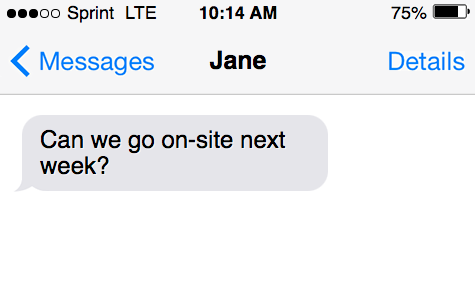Is it onsite or on-site? Compound words can be confusing to comprehend. When a word is connected by a hyphen, it is called a hyphenated compound. These are words like long-term, brother-in-law, and mother-in-law. Compound words can also get written as a closed compound (joined to form a single word), these are words like doorknob, mailbox, afterthought, and highway.
Learn which word form is correct in this short guide…
Why is there confusion between the words onsite or on-site?
This word is commonly used in business settings. When writing business language or professional letters, it’s not uncommon to want to use the correct word forms to prevent embarrassment or situations where a lack of professionalism can occur.
These two word forms look identical and are only separated by a hyphen. Causing them to get confused and a question to arise, “Which word is grammatically correct in the English language?”
Onsite definition
Let’s take a look at the definition of the word “onsite.”
| Word | Definition |
| Onsite (adjective) /ˌônˈsīt/ | taking place or situated at a particular place or site. |
Which is correct? Is it onsite or on-site?
While both forms of the word are technically correct, let’s look at how each dictionary and style guide refers to the use of the word.
| Entity | Use and definition |
| AP Style | The AP Style manual refers to compound words connected by a hyphen as “joiners,” and in the 2020-2022 Edition of the guide, it refers to having the words with a hyphen be “a matter of taste, judgment and style sense.” |
| Merriam-Webster | On-site |
| Cambridge English Dictionary | Onsite |
| Dictionary.com | On-site |
| Chicago Manual of Style | On-site |
Key differences
Technically, there is no key difference between the words on-site and onsite. It is a matter of style, taste, and choice. Both are grammatically correct in the English language and can get used interchangeably.
- Correct use: I went onsite in order to help solve some of the IT problems with the system.
- Correct use: I went onsite in order to help solve some of the IT problems with the system.

Onsite sentence examples
Below are sentence examples using the word onsite:
- We are going to make a plan to visit onsite in the next few weeks.
- Our team is deciding whether we’d like to visit onsite or do this remotely.
- We need to take precautions when visiting onsite and make sure that we accommodate everyone’s needs.
- It would be easier if we could see what’s happening onsite rather than remotely.
On-site sentence examples
Below are sentence examples using the word on-site:
- I want to go on-site to see if I can troubleshoot what’s happening.
- Our team needs to visit them on-site to pitch the proposal.
- They’d like to us to make a visit on-site to meet with the team.
- We can go on-site in order to connect with them if we need to.
How to remember which word form to use
The answer to this is simple, it’s your choice. Both word forms (either with or without a hyphen) are technically correct. And can get used interchangeably.
And while that is true, the recommendation is to use on-site, because is used by the Oxford Dictionary, Chicago Manual of Style, and suggested in AP Style.
Common questions
Questions and answers about the English language.
Is onsite one word?
Yes. The word “onsite” is one word and not two. The incorrect form and spelling would be “on site.”
Is onsite hyphenated?
The word onsite or on-site can either be hyphenated or not hyphenated. Technically, it is a choice of style rather than grammatically correct spelling.
Inside this article
Fact checked:
Content is rigorously reviewed by a team of qualified and experienced fact checkers. Fact checkers review articles for factual accuracy, relevance, and timeliness. Learn more.
Core lessons
Glossary
- Abstract Noun
- Accusative Case
- Anecdote
- Antonym
- Active Sentence
- Adverb
- Adjective
- Allegory
- Alliteration
- Adjective Clause
- Adjective Phrase
- Ampersand
- Anastrophe
- Adverbial Clause
- Appositive Phrase
- Clause
- Compound Adjective
- Complex Sentence
- Compound Words
- Compound Predicate
- Common Noun
- Comparative Adjective
- Comparative and Superlative
- Compound Noun
- Compound Subject
- Compound Sentence
- Copular Verb
- Collective Noun
- Colloquialism
- Conciseness
- Consonance
- Conditional
- Concrete Noun
- Conjunction
- Conjugation
- Conditional Sentence
- Comma Splice
- Correlative Conjunction
- Coordinating Conjunction
- Coordinate Adjective
- Cumulative Adjective
- Dative Case
- Determiner
- Declarative Sentence
- Declarative Statement
- Direct Object Pronoun
- Direct Object
- Diction
- Diphthong
- Dangling Modifier
- Demonstrative Pronoun
- Demonstrative Adjective
- Direct Characterization
- Definite Article
- Doublespeak
- False Dilemma Fallacy
- Future Perfect Progressive
- Future Simple
- Future Perfect Continuous
- Future Perfect
- First Conditional
- Irregular Adjective
- Irregular Verb
- Imperative Sentence
- Indefinite Article
- Intransitive Verb
- Introductory Phrase
- Indefinite Pronoun
- Indirect Characterization
- Interrogative Sentence
- Intensive Pronoun
- Inanimate Object
- Indefinite Tense
- Infinitive Phrase
- Interjection
- Intensifier
- Infinitive
- Indicative Mood
- Participle
- Parallelism
- Prepositional Phrase
- Past Simple Tense
- Past Continuous Tense
- Past Perfect Tense
- Past Progressive Tense
- Present Simple Tense
- Present Perfect Tense
- Personal Pronoun
- Personification
- Persuasive Writing
- Parallel Structure
- Phrasal Verb
- Predicate Adjective
- Predicate Nominative
- Phonetic Language
- Plural Noun
- Punctuation
- Punctuation Marks
- Preposition
- Preposition of Place
- Parts of Speech
- Possessive Adjective
- Possessive Determiner
- Possessive Case
- Possessive Noun
- Proper Adjective
- Proper Noun
- Present Participle
- Prefix
- Predicate



